- Home
- Andrew Wareham
The Odd-Job Man (The Duty and Destiny Series, Book 7)
The Odd-Job Man (The Duty and Destiny Series, Book 7) Read online
Book Seven: The Duty
and Destiny Series
From the author of the acclaimed,
‘A Poor Man at the Gate’ Series
Andrew Wareham
Digital edition published in 2015 by
The Electronic Book Company
A New York Times Best-seller
Listed Publisher
www.theelectronicbookcompany.com
www.facebook.com/quality.ebooks
This ebook is licensed for your personal enjoyment only. This ebook may not be re-sold or given away to other people. If you would like to share this ebook with another person, please purchase an additional copy for each recipient. If you’re reading this ebook and did not purchase it, or it was not purchased for your use only, then please purchase your own copy. Thank you for respecting the hard work of this author. This ebook contains detailed research material, combined with the author's own subjective opinions, which are open to debate. Any offence caused to persons either living or dead is purely unintentional. Factual references may include or present the author's own interpretation, based on research and study.
The Odd-Job Man
Copyright © 2015 by Andrew Wareham
All Rights Reserved
Contents:
Title Page
Copyright Page
Introduction
Chapter One
Chapter Two
Chapter Three
Chapter Four
Chapter Five
Chapter Six
By the Same Author
Introduction
The Odd-Job Man: Frederick Harris is once again given command of a small squadron of ships with orders to discover Bonaparte’s invasion capabilities and to generally ruffle a few feathers along the French coast. Later he is sent to Gibraltar to undertake more tasks including trying to protect a merchant convoy from murderous Barbary Pirates.
Author’s Note: I have written and punctuated The Odd-Job Man in a style reflecting English usage in novels of the Georgian period, when typically, sentences were much longer than they are in modern English. Editor’s Note: Andrew’s book was written, produced and edited in the UK where some of the spellings and word usage vary slightly from U.S. English.
Book Seven: The Duty and Destiny Series
Chapter One
“Sir Frederick, an early and in many ways a fortunate return! How was your voyage? And the journey from Liverpool?”
Sir Frederick made his bow and gave the correct smile.
“The voyage, my Lord? A small ship crossing the Atlantic and myself a passenger. Tedious in many ways, but there was a degree of pleasure at hearing the night watches called and rolling over in my cot and going back to sleep!”
Jervis laughed – his watch-keeping days were long past, but he could still easily recall the deadly tedium of the small hours, and of the unending, unspoken worry. Was there a convoy, then had he lost contact; if they were on blockade, had he strayed inshore, might dawn find them under the guns of a coastal battery? He felt a twinge of indigestion at the very memory.
“As for the overland journey, my Lord – indescribable! It rained! A post-chaise and four, and not dagger-cheap, and plodding through mud, rarely at more than a walk!”
“A pity it could not have been Bristol. The Great West Road is far better, but Raven is due to the German Ocean, the stretches towards Denmark and her Norwegian waters particularly.”
Frederick had assumed that to be the case – Liverpool was not one of the Navy’s chosen harbours and was used only for specific purposes, for ships soon to be sent north.
“Word has been spread of the action with Santiago – Cloudesly Shovell, as she now is, Sir Frederick. Hardly surprising that it should be so, of course. On paper it seems a surprising victory, one that should be trumpeted to the very heavens!”
“A pair of heavy frigates, my Lord, matching her for broadside weight, even if not so heavily built and able to take punishment. It was not so uneven a fight, though it could have been made so with clever ship-handling. Fortunately for myself and for Captain Jackman, the Spanish captain was over-ruled by the army officers aboard. Strange as it may seem to us, the fact that the General was a duke enabled him to give orders on the captain’s quarterdeck!”
Jervis snorted his opinion of that particular ordinance; it would in his opinion have been a very unusual duke who had attempted that with him.
“Add to that, my Lord, the captain was killed in the first exchange of fire and his lieutenants may well have been appointed for their breeding rather than for their professional competence. Rather than use the advantage of their long guns, they allowed us to close them and cross bows and stern – three times in the case of Captain Jackman!”
Jervis showed his approval – a rare enough event, but he had been an aggressive captain himself.
“I remember you telling me that he was a fighting seaman of the finest kind, Sir Frederick. At the time I discounted your words to an extent – he is a follower of yours, after all. I must now acknowledge my error. As well, Sir Frederick, I have another error to confess. Hercules, 74, will not leave dock in Portsmouth for several months yet. It seems that repairs made to her bows in English Harbour were skimped – the damned dockyard used unseasoned wood – though I doubt not they billed us for the best! Rot has been discovered and must be cut out and almost the whole of the bows rebuilt. And then she is to be re-rigged; while she is in dock it is as well to complete the whole job at once. As a result, as you will appreciate, you are not to be given her just yet!”
Frederick achieved a smile and managed to say that it was unfortunate but a matter of luck. He could afford a few months of half-pay.
“That, Sir Frederick, is not the Board’s intention. The upstart Bonaparte is assembling a great army along the Channel Coast and is building invasion craft quite literally by the thousand in every port from the north of Holland to the south of Spain. He must, of course, have control of the Channel for a week to mount his invasion, and that, I am convinced, will never eventuate. Lord Nelson agrees with me. The politicians, however, are not so sanguine and demand that action must instantly be taken against his armada. They have heard of Singeing the King of Spain’s Beard – what they wish to do to Bonaparte is unrepeatable! You are offered the privilege of being the officer who will meet their demands.”
As always, Frederick was at liberty to decline the command – with the knowledge that if he did so he would never go to sea again, or not in the memory of this First Lord and his friends.
“I am, as ever, my Lord, wholly yours to command.”
“Elegantly said, Sir Frederick!”
“Thank you, my Lord. My wife has been training me in the courtesies of life.”
“Lord Partington’s daughter, I believe, Sir Frederick.”
Frederick admitted she was – it never hurt to mention another vote in the House of Lords. Jervis was well aware of the Alton connection and of the politician Critchel in the background; now he could add another source of influence, however much a backwoodsman the peer was.
“Excellent, Sir Frederick. Before we move on and just to clarify matters: the Santiago launched a piratical attack upon your squadron, opening fire on you in time of peace. Acting to defend your ships, you set about her, a pair of frigates – small need to use the word ‘heavy’ - in action with a Second-Rate. Due greatly to your tactics and the bloody-handed zeal of the young hero, Captain Jackman, you forced her surrender in an action notable for its massive casualties – again, there is little need to specify that the casualties were almost wholly those caused to the Spaniard. I shall ensure t
hat the word of this untoward passage of arms comes to the ears of the Prince of Wales, in exactly this form…”
Frederick did not need to be told to keep strictly to this only slightly amended version of the truth.
“Now, Sir Frederick, you are to have another squadron, with pay and perquisites as if you were commanding a Third-Rate. You must tell your man to dig out the proper uniform immediately, sir, though you were very right not to wear it just now. Is it still the African man, Bosomtwi, who has a name in his own right, I remember?”
“It is, my Lord. There is much to be said for a servant who is a warrior born.”
“There is indeed, Sir Frederick!”
Frederick waited for the blow to fall – the First Lord was not by nature a sweet-tempered gentleman and he as a rule saw little point in wasting excessive politeness on his juniors. The efforts he was making to show courtesy and a friendly interest in Frederick’s affairs suggested that he had another bodyblow to offer.
“You are to fly your flag on Acheron frigate, Sir Frederick. She is of thirty-two guns, twelve pounders, and may fairly be described as old in the service. She was built, I believe, a year or so before Victory.”
“Nearly one half of a century ago, my Lord. She is certainly not the most modern of vessels!”
“That is true, but she is still fully capable of service in Home Waters.”
That carried the implication that she was not fit for any long voyage, that she should not venture more than a very few days away from the dockyard. Acheron was, in blunt terms, expendable, on what was probably her last commission in the service.
“She has carronades and chasers, one presumes, my Lord?”
“A pair of nine-pound brass long guns and six of twenty-four pound carronades. She has been fitted with a pair of davits on the stern quarters and is particularly suited for small-boat work. She has an extra pair of pulling boats, Sir Frederick. She is also well up for men, and has extra Marines put aboard her specifically for this duty.”
The extra hands – mouths more precisely – were not to be a problem.
“Water will be of no concern in the Channel, of course – we may expect to be out for very few days at a time. She is not to be attached to the blockading squadrons, so one need not be too concerned about victuals, my Lord. What other craft are there to make up the squadron?”
“They are in fact in process of being assembled, Sir Frederick. Sloops, or one at least; a number of gun-brigs and certainly one very fast cutter for the purpose of scouting. Other small craft may be put together, as the need arises. There is to be one at least of designated fireships. The aim is to put together a flotilla of speedy, shallow-draft vessels, able to enter any of the harbours of the French coast, or to assault a fishing village, for example, so as to place a party ashore.”
Setting parties ashore on a coast that contained an invasion army seemed rather a rash venture to Frederick. The First Lord evidently read the expression on his face.
“Raids, of course, Sir Frederick, perhaps to burn down a warehouse containing rations, or to destroy a boatyard at a strategic location. There is to be no question of remaining ashore more than a very few hours.”
“None indeed, my Lord!”
“Initially, Sir Frederick, your squadron is to be assembled at Portsmouth, but you may well be able to base yourself on the Sussex or Kent coast, closer to the narrows of the Channel. It is my first thought that you will be able to achieve a little before winter is upon you, but that you can ready yourself for an effective onslaught on the French in spring.”
That sounded more hopeful. Six months of working up his squadron, praying that the French might have changed their minds about invasion the while.
“You will be able to fly your flag four weeks from today, Sir Frederick.”
Presumably that mean Acheron would have been released from the dockyard by then, her bottom patched sufficiently that she might float for another winter.
“Thank you, my Lord. I shall make my way to my home. An Express or a Marine may reach me at Abbey for the next weeks, after which I would expect to shift to my house nearer to Portsmouth, or possibly to the estate at Boorley Green which I have now inherited. I may, of course, visit a few days with Lord Alton.”
It did no harm at all to remind the First Lord again that he owned land and had noble relatives; he had a feeling he might need all of his influence in the command he had just been given.
It was late in the day to set out for Dorset so he took a room at the posting house at Charing Cross before making his way to the premises of Rundell and Bridge, the premier jewellers of the country. It was not exactly that his conscience was pricking him, but he would feel more comfortable arriving with a gift in his hands… and, besides, there was the new baby to celebrate.
They were two days on the road, doing well they felt to achieve the journey in such time, and attracting the stares of the yokels wherever they stopped. A post-captain, in his Commodore’s uniform, having no civilian clothes to hand; three black men, two of them vast in size; a little Indian cook and his coxswain dressed in his own uniform – it was as good as a raree show. You didn’t see that sort of a sight but once in ten years, so they said.
Frederick was uncomfortably aware that he was the cynosure of all eyes, and had a suspicion that there was a less than respectful look on some faces. It would have been better if he could have worn little in the way of gold lace in a countryside that had experienced near-famine conditions for nearly twenty years; men who counted every penny could not be expected to love those who flaunted their wealth.
Raven had far outrun any despatch from Antigua and Frederick’s arrival was wholly unexpected, but not, he rapidly gathered, at all unwelcome. He was instantly taken to the cradle to observe Jane Elizabeth, sound asleep as a good baby should be after feeding; he made all of the appropriate sounds and detected an immediate resemblance to her mama, having learned all that was expected of a father.
“But why are you home so soon, my love? Has it something to do with this, peculiar, shall we say, business with the ship Santiago? And, if I may enquire, how exactly did that come about, sir, in the absence of war?”
“Ignorance at a distance, my dear. We were quite certain that we must be at war, and the Spanish allow for no peace ‘beyond the line’, holding that any foreign ship is a pirate in strictest law. By their law, of course, they are correct; by ours they are damned tyrants who need their ar… hinder parts kicked. Fortunately, the Spanish may be shown to have attacked us and our actions are therefore wholly those of self-defence. Captain Jackman showed especially well in the battle and it is not impossible that he may receive a knighthood for his actions. He has as well added a respectable amount to his fund of prize-money, which, if your sister is still inclined to favour him, will sit well with your father.”
“Charlotte has great hopes of him and I think is determined to wed him.”
“Good, for I know he is of the same mind. You might feel safe in telling her so, my dear.”
“When will he return to England, do you know, Frederick?”
“Two years, I would expect. It is a matter of luck to a great extent. He has Trident now and will use her during the taking of Guiana. After that, who can tell? He may well be sent to the Cape, but just as likely he could come back to England. It is doubtful that he will remain in the Sugar Islands – the need for a larger frigate becomes less and less there. Sloops by the score to put down privateers and pirates, and possibly a fleet of seventy-fours to stand against the Spaniards, but the main problem of France is become much less in those seas.”
She was happy to hear this – her sister was dear to her.
“If Captain Jackman has picked up prize-money then I presume you must also have done so, my love.”
Frederick grinned and rubbed his hands together.
“A very respectable little sum, my love! Exactly how much I do not know, but more than a few thousands, for sure. Enough that I could drop by Rundell and
Bridge while I was in town – I thought this necklace to be rather pretty.”
She tended to agree – but diamonds could only be ugly with difficulty.
“And for how long are you mine, my love?”
“Four weeks. I am given a squadron in the Channel to take action against the invasion fleet being built up there. We shall be based on the coast, naturally, and will rarely be far from Portsmouth, so I shall be back very frequently. A winter spent at Long Common or at the Harris estate will be no hardship, I trust?”
“None at all, sir!”
“It may be possible to spend a week or two in London at an appropriate time. We have missed the Season, have we not?”
“It is petering out, I would imagine. Most of the ton will have returned to their houses by now. Come, sir, Iain will have been released from the schoolroom and you must greet him and Robert, though he may still be asleep yet.”
Iain could read, he proudly announced, and he knew his alphabet and could write quite a number of words. He could count as well.
“I am very pleased that you are so forward, my son! Not at all surprised, of course. You will need your letters when you become Sir Iain and master of the Abbey Estate and a magistrate and quite possibly a Member of Parliament as well. Many people will rely on you, my son, and you must have the knowledge to guide their lives.”
Iain was impressed and promised to do his best.
“Is Mr Bosomtwi here as well, sir? I wish to talk to him about a pony, for my little Captain is too small for me now, or so I think, sir. He could become Robert’s and then sister Jane’s in her turn, for he is a very good pony for the younger children, sir.”
“He is here, and will no doubt be in his stables by now. Go and find him, Iain.”
He watched Iain trot away, confident although so young.

 A Killing Too Far
A Killing Too Far Killing's Reward
Killing's Reward A New Place
A New Place The Killing Man
The Killing Man Bold and Blooded
Bold and Blooded The Breaking Storm (Innocent No More Series, Book 2)
The Breaking Storm (Innocent No More Series, Book 2) Nobody’s Child
Nobody’s Child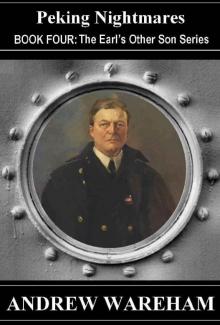 04 Peking Nightmares (The Earl’s Other Son Series, #4)
04 Peking Nightmares (The Earl’s Other Son Series, #4) Red Man
Red Man Foreign Mud
Foreign Mud The Gathering Clouds (Innocent No More Series, Book 1)
The Gathering Clouds (Innocent No More Series, Book 1) 06 A Soldier’s Farewell (Man of Conflict #6)
06 A Soldier’s Farewell (Man of Conflict #6)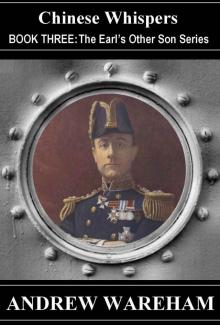 Chinese Whispers
Chinese Whispers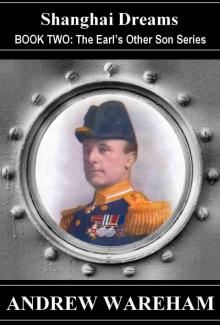 02 Shanghai Dreams (The Earl’s Other Son #2)
02 Shanghai Dreams (The Earl’s Other Son #2) Hungry Harry: An Orphan in the Ranks
Hungry Harry: An Orphan in the Ranks A Wretched Victory (Innocents At War Series, Book 6)
A Wretched Victory (Innocents At War Series, Book 6) Illusions Of Change (A Poor Man at the Gate Series Book 6)
Illusions Of Change (A Poor Man at the Gate Series Book 6) The Wages Of Virtue (A Poor Man at the Gate Series, Book 8)
The Wages Of Virtue (A Poor Man at the Gate Series, Book 8) Blood and Famine (Man of Conflict Series, Book 4)
Blood and Famine (Man of Conflict Series, Book 4) The Friendly Sea (The Duty and Destiny Series, Book 1)
The Friendly Sea (The Duty and Destiny Series, Book 1) Bursting Balloons (Innocents At War Series, Book 5)
Bursting Balloons (Innocents At War Series, Book 5) The Death of Hope
The Death of Hope Deadly Shores (The Duty and Destiny Series, Book 11)
Deadly Shores (The Duty and Destiny Series, Book 11) The Vice Of Virtue (A Poor Man At The Gate Series Book 10)
The Vice Of Virtue (A Poor Man At The Gate Series Book 10) Virtue’s Reward (A Poor Man at the Gate Series, Book 11)
Virtue’s Reward (A Poor Man at the Gate Series, Book 11) A Deadly Caper (Innocents At War Series, Book 2)
A Deadly Caper (Innocents At War Series, Book 2)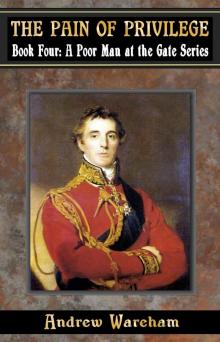 The Pain Of Privilege (A Poor Man at the Gate Series Book 4)
The Pain Of Privilege (A Poor Man at the Gate Series Book 4) Far Foreign (The Duty and Destiny Series, Book 9)
Far Foreign (The Duty and Destiny Series, Book 9)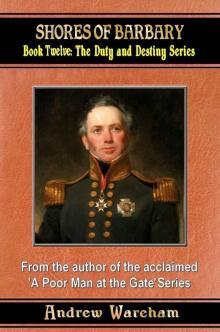 Shores of Barbary (The Duty and Destiny Series, Book 12)
Shores of Barbary (The Duty and Destiny Series, Book 12)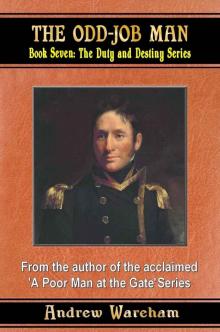 The Odd-Job Man (The Duty and Destiny Series, Book 7)
The Odd-Job Man (The Duty and Destiny Series, Book 7) Fire and Folly (Man of Conflict Series Book 3)
Fire and Folly (Man of Conflict Series Book 3) A Victorian Gent (The Making of a Man Series, Book 1)
A Victorian Gent (The Making of a Man Series, Book 1)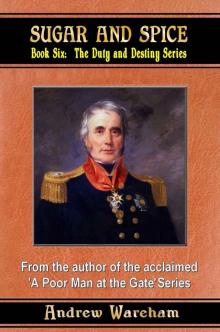 Sugar and Spice (The Duty and Destiny Series, Book 6)
Sugar and Spice (The Duty and Destiny Series, Book 6) Dark Days Of Summer (Innocents At War Series, Book 4)
Dark Days Of Summer (Innocents At War Series, Book 4) Dire Shenanigans (The Making of a Man Series, Book 2)
Dire Shenanigans (The Making of a Man Series, Book 2) The Fuzzy-Wuzzy Man (The Duty and Destiny Series, Book 3)
The Fuzzy-Wuzzy Man (The Duty and Destiny Series, Book 3) Privilege Preserved (A Poor Man at the Gate Series Book 5)
Privilege Preserved (A Poor Man at the Gate Series Book 5) No Longer A Game (Innocents At War Series, Book 3)
No Longer A Game (Innocents At War Series, Book 3)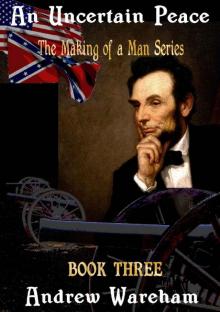 An Uncertain Peace (The Making of a Man Series, Book 3)
An Uncertain Peace (The Making of a Man Series, Book 3) Fortune And Glory (The Duty and Destiny Series, Book 5)
Fortune And Glory (The Duty and Destiny Series, Book 5) The Old Order (A Poor Man at the Gate Series Book 7)
The Old Order (A Poor Man at the Gate Series Book 7) A Place Called Home (Cannibal Country Trilogy, Book 2)
A Place Called Home (Cannibal Country Trilogy, Book 2) Nouveau Riche (A Poor Man at the Gate Series, Book 2)
Nouveau Riche (A Poor Man at the Gate Series, Book 2) The Privateersman (A Poor Man at the Gate Series Book 1)
The Privateersman (A Poor Man at the Gate Series Book 1) Britannia’s Son (The Duty and Destiny Series, Book 4)
Britannia’s Son (The Duty and Destiny Series, Book 4) Long Way Place (Cannibal Country Trilogy, Book 1)
Long Way Place (Cannibal Country Trilogy, Book 1) Spanish Tricks (Man of Conflict Series, Book 5)
Spanish Tricks (Man of Conflict Series, Book 5) A Parade Of Virtue (A Poor Man At The Gate Series Book 9)
A Parade Of Virtue (A Poor Man At The Gate Series Book 9)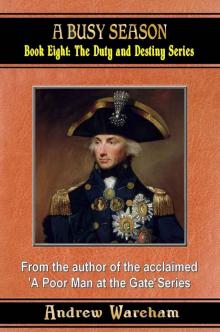 A Busy Season (The Duty and Destiny Series, Book 8)
A Busy Season (The Duty and Destiny Series, Book 8) Billy Bacon and the Soldier Slaves (Colonial Warrior Series, Book 1)
Billy Bacon and the Soldier Slaves (Colonial Warrior Series, Book 1) Raging Rajahs (Man of Conflict Series, Book 2)
Raging Rajahs (Man of Conflict Series, Book 2) Victorian Dawn (A Poor Man at the Gate Series, Book 12)
Victorian Dawn (A Poor Man at the Gate Series, Book 12) Born To Privilege (A Poor Man at the Gate Series Book 3)
Born To Privilege (A Poor Man at the Gate Series Book 3) The Soldier Brat (Man of Conflict Series, Book 1)
The Soldier Brat (Man of Conflict Series, Book 1)